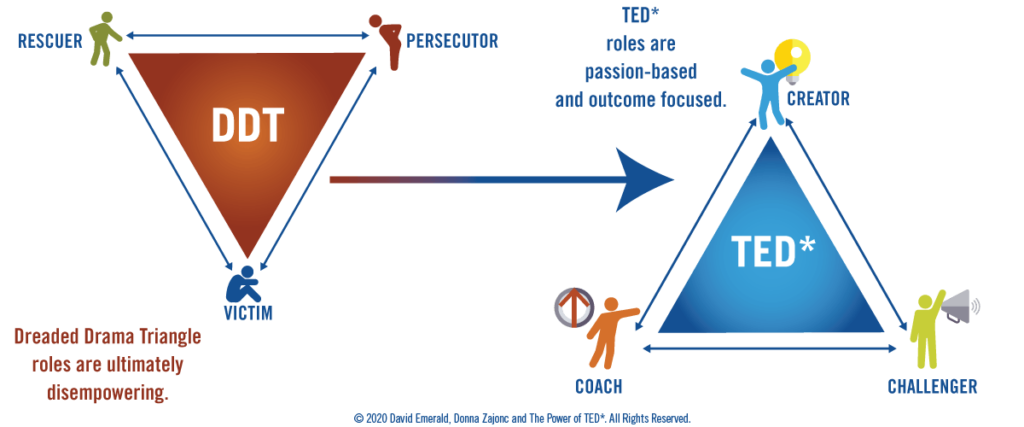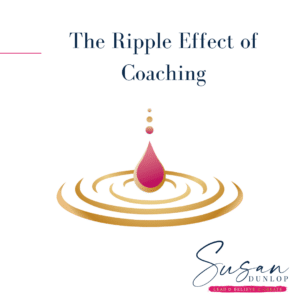Yes, it’s all been drama!
For someone who isn’t a drama fan, I’ve spent a hell of a lot of time talking all things drama since January this year.
I’ll share here a link to the podcast episode where I speak about it, for those who prefer to listen to a short audio rather than read.
I personally came across the Drama Triangle some 16 years ago, and it completely resonated with me. Not only in how I could see relationships being played out in my family of origin and within the team of my business; but also within me! Busy as I was, I shelved that new knowledge because at the time I couldn’t see what the actionable steps were to break that pattern of behaviour for myself let alone whether it was possible to do it with others.
Then, as a trained coach in 2018 I met David Emerald, the founder and author of the book The Power of TED* (*The Empowerment Dynamic) which, by chance, happens to be a triangle of 3 empowering passion-fuelled, outcomes-focused roles. The TED* roles are the antidote to the roles of the Drama Triangle!

What I’m talking about is the Drama Triangle, or Dreaded Drama Triangle, because of its toxic brew of roles and dynamics, which are firmly rooted in a problem orientation or victim orientation, one and the same things.
This orientation perpetuates the drama of the Drama Triangle.
I’m talking about daily drama in work and life: the soft stuff, the human stuff, that is problem focused; driven by an inner state of anxiety; and reactive in behaviour.
No matter what issue most business owners come to coaching or mentoring for, underlying nearly all, are the issues relating to the people within the business.
Focusing on how we relate to others, how we relate to what is going on around us (our experience) and even how we relate to ourselves – this stuff is gold!
Human beings have common strategies we use to manage fear and anxiety.
It’s that work that is integral to deepen our understanding of before we try to juggle everything else we think is more important.
Life’s dramas – whether in various forms of entertainment or in the not-so-entertaining reality of our daily experience – involve three roles.
They are the Victim (the central role) who is reacting to a Persecutor (which they see as a problem in their life) and the Rescuer (someone or something that comes to “save the day” or fix the situation). All the roles needed for drama.
If this is our default orientation the drama triangle is our default way of relating.
We all learn these roles very early in life as ways of both protecting ourselves, as well as strategies for getting our basic survival, safety, and security needs met. No one can escape the small child experience of what we saw as scary experiences. The downside is that the roles, along with the problem-focused Victim Orientation, usually become so ingrained that they unconsciously become our default ways of thinking, relating, and taking action.
Karen Horney, the American psychoanalyst, gave us three classifications of a child’s response to fear.
- Moving toward people to please, accommodate, and be helpful. From a child’s perspective, if I please others, they will love and care for me. This is the strategy of a Rescuer.
- Moving away from others to avoid, withdraw, observe, and wait. This is based upon the child’s belief that if they isolate and “stay above the fray” they will be safe. This feeds the perspective of the Victim.
- Moving against others by being aggressive. Here the child develops the idea that, if they use control and domination, they will manage their environment to get what they want. This is the defensive strategy of a Persecutor.
All 3 are strategies of protection from the dangers of life.
The reality is that we all play all 3 roles.
We all can play all three roles, all by ourselves, within seconds. It’s hard to not see it now that you know about it.
As the saying goes when the student is ready the teacher appears.
I have since become a certified trainer in David’s work, with business leaders and people I Coach. I’d say the kinds of people I coach are those who are choosing to lead (not follow), and be role models, in all areas of their personal life and relationships.

Encapsulating David’s work into the coaching program makes the work we do incredibly powerful, authentic and truly sets in place an honest and actionable path forward.
It also has the ripple effect of creating a new language for clients to take back to their families, work colleagues, and begin the change spreading far further than just for themselves.
What is becoming increasingly popular, is the eCourse in a blended delivery for groups of up to 10 at a time; be that individuals or work teams. The 8-module eCourse with facilitated coaching sessions, in between the online modules, comes at a very reasonable price. It is a brilliant first step, with deepened learning. You’ll be surprised at how easy each step away from drama towards empowerment can be.
If you’d like to explore that alternative empowering way of operating in life and at work, I can help you. It results in creating more freedom, innovation, resilience and joy in all that you are and what you do!
Book a time for up to a 30-minute Discovery Call. We can talk about how this work will serve you in all you do.
Have you tried the Drama Triangle Quiz? Here is the link for you to do that if you wish. It’ll take you 3-minutes to complete; or 5-minutes if you overthink the answers.
All the best for now,
Susan

